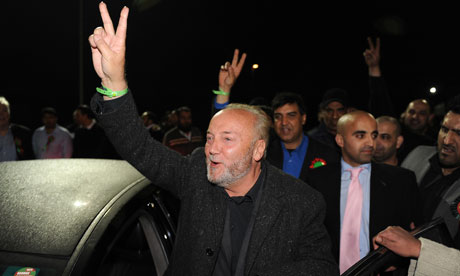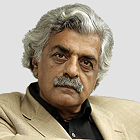Tariq Ali appears on the Guardian making a claim for George Galloway's "impact" [1]
The Tariq Ali claim is reproduced in full below from the Guardian web site for reference:
____________
George Galloway's Respect could help Britain to break the political impass
UK politics has been governed by Thatcherism for decades. Galloway's triumph should force people to rethink their passivity

George Galloway's stunning electoral triumph in the Bradford by-election has shaken the petrified world of English politics. It was unexpected, and for that reason the Respect campaign was treated by much of the media (Helen Pidd of the Guardian being an honourable exception) as a loony fringe show. A BBC toady, an obviously partisan compere on a local TV election show, who tried to mock and insult Galloway, should be made to eat his excremental words. The Bradford seat, a Labour fiefdom since 1973, was considered safe and the Labour leader, Ed Miliband, had been planning a celebratory visit to the city till the news seeped through at 2 am. He is now once again focused on his own future. Labour has paid the price for its failure to act as an opposition, having imagined that all it had to do was wait and the prize would come its way. Scottish politics should have forced a rethink. Perhaps the latest development in English politics now will, though I doubt it. Galloway has effectively urinated on all three parties. The Lib Dems and Tories explain their decline by the fact that too many people voted!
Thousands of young people infected with apathy, contempt, despair and a disgust with mainstream politics were dynamised by the Respect campaign. Galloway is tireless on these occasions. Nobody else in the political field comes even close to competing with him – not simply because he is an effective orator, though this skill should not be underestimated. It comes almost as a shock these days to a generation used to the bland untruths that are mouthed every day by government and opposition politicians. It was the political content of the campaign that galvanised the youth: Respect campaigners and their candidate stressed the disasters of Iraq and Afghanistan. Galloway demanded that Blair be tried as a war criminal, and that British troops be withdrawn from Afghanistan without further delay. He lambasted the Government and the Labour party for the austerity measures targeting the less well off, the poor and the infirm, and the new privatisations of education, health and the Post Office. It was all this that gave him a majority of 10,000.
How did we get here? Following the collapse of communism in 1991, Edmund Burke's notion that "In all societies, consisting of different classes, certain classes must necessarily be uppermost," and that "The apostles of equality only change and pervert the natural order of things," became the commonsense wisdom of the age. Money corrupted politics, and big money corrupted it absolutely. Throughout the heartlands of capital, we witnessed the emergence of effective coalitions: as ever, the Republicans and Democrats in the United States; New Labour and Tories in the vassal state of Britain; socialists and conservatives in France; the German coalitions of one variety or another, with the greens differentiating themselves largely as ultra-Atlanticists; and the Scandinavian centre-right and centre-left with few differences, competing in cravenness before the empire. In virtually every case the two- or three-party system morphed into an effective national government. A new market extremism came into play. The entry of capital into the most hallowed domains of social provision was regarded as a necessary reform. Private financial initiatives that punished the public sector became the norm and countries (such as France and Germany) that were seen as not proceeding fast enough in the direction of the neoliberal paradise were regularly denounced in the Economist and the Financial Times.
To question this turn, to defend the public sector, to argue in favour of state ownership of utilities or to challenge the fire sale of public housing was to be regarded as a dinosaur.
British politics has been governed by the consensus established by Margaret Thatcher during the locust decades of the 80s and 90s, since New Labour accepted the basic tenets of Thatcherism (its model was the New Democrats' embrace of Reaganism). Those were the roots of the extreme centre, which encompasses both centre-left and centre-right and exercises power, promoting austerity measures that privilege the wealthy, and backing wars and occupations abroad. President Obama is far from isolated within the Euro-American political sphere. New movements are now springing up at home, challenging political orthodoxies without offering one of their own. They're little more than a scream for help.
Respect is different. It puts forward a leftist social-democratic programme that challenges the status quo and is loud in its condemnation of imperial misdeeds. In other words, it is not frightened by politics. Its triumph in Bradford should force some to rethink their passivity and others to realise that there are ways in which the Occupiers of yesteryear can help to break the political impasse.
• Follow Comment is free on Twitter @commentisfree




























